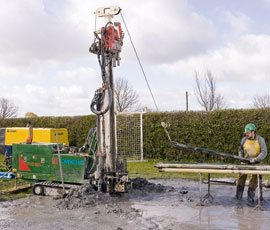Borehole pays for itself within a year

Installing a borehole has resulted in water cost savings of £500 a month for one Somerset dairy producer, Debbie James reports
A farmer has in one year recovered the £6,000 cost of creating his own supply of water to meet the drinking water needs of his dairy and beef herd.
Tom Kimber’s mains system had been costing £1,000 a month, even after taking into account an ancient right that allows the farm to use 1,000 gallons of water a day without charge.
Mr Kimber milks 200 cows, rears his own replacements and runs 100 head of beef cattle and 100 pigs at High Stavordale Farm, Wincanton.
Eighteen months ago he decided to drill a borehole to reduce his water bills. He says the decision was a good one because he is now making a £500 a month saving on water costs and admits it is the quickest payback he has ever had from a single capital outlay. “It paid for itself within a year, my only regret is that we didn’t do it sooner,” says Mr Kimber.
He had seen the benefits of a borehole on a neighbouring farm but drilling for water on his own land wasn’t as straightforward. On the adjoining farm the borehole driller had to go down 100 feet to reach a water source but it was more than double that on Mr Kimber’s farm.
“We have got heavy clay soil and although it is wet it doesn’t give up water that easily. We had to drill down 240ft,” he explains.
The deeper the borehole the higher the capital cost. The cost for every metre of drilling depends on geology and site conditions but typically this ranges from £35-65 a linear metre. The cost of lining and packing the borehole is charged per metre and works out on average at around £21 a linear metre.
At Mr Kimber’s farm, a submersible pump has been installed at the base of a 4in pipe and there is a receiving vessel at the top. When the volume of water in that vessel falls below a certain level the pump is activated. It pumps on demand to the storage tank and water is gravity fed into the water network.
The cost of a pump is dependent on the depth of the borehole, the water flow and the pressure requirements of the system. The distance the water has to travel is a consideration too.
The 2003 Water Act allows anyone to extract up to 20,000 litres a day without licence or charge. For greater volumes, an Abstraction Licence must be obtained from the Environment Agency.
Mr Kimber extracts eight cubic metres of water daily and uses this only as drinking water for the livestock. His entitlement to a thousand gallons of free mains water influenced his decision not to expand usage of the borehole water because he would have had to install UV filters at additional cost.
A chemical analysis of the water at High Stavordale Farm revealed that it had a very high iron content and therefore a potassium manganate filtration unit was installed to rectify this issue. If this had not been done the cattle would have experienced health issues associated with copper lock-up.
Since installing the borehole, the Kimbers have bought another farm and are keen to establish a borehole there also. The remote location of the site had been a potential hurdle because no electricity source is available to power the submersible pump. But Mr Kimber has found a solution in the form of a solar panel system.
Mr Kimber’s borehole is a success story but there are several considerations farmers should make before taking this route.
Chris Coxon, DairyCo extension officer, says among the most important initial step is contacting the Environment Agency to establish if anyone else is abstracting water from the same source and if it is possible to abstract up to 20cu m a day without a licence. The farmer should get a geologist’s report and prepare draft costings of capital and running costs to establish what savings can be made.
The advantages, says Mr Coxon, include significant cost savings but there are disadvantages to consider including the initial financial outlay. Running costs should not be overlooked either.
If the water is used for hand, udder or dairy plant washing it will need to be assessed annually by the local authority’s environmental health department.
* When storing farmyard manure in a field it must not be placed within 50m of a borehole, spring or well. For more information go to www.fwi.co.uk/nvzguidance
